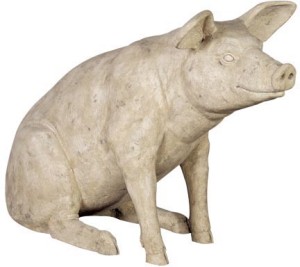Last Will and Testament of a Pig January 10, 2011
Author: Beach Combing | in : Ancient , trackbackBeachcombing ran across a curious little work today: the Testamentum Porcelli, Will of a Pig. It is possible that he read it many years ago because it seemed vaguely familiar: there is certainly something pleasingly grotesque in its words – a bit Roald Dahl – that brought Beachcombing back to his early 20s when Beach drank too much coca cola and read too much medieval Latin poetry.
Glory, what a pathetic and inadequate life Beachcombing has led…
The earliest reference to this jeering piece comes suitably enough in the work of that arch jeerer Saint Jerome, one of the few individuals in history that Beachcombing truly despises. Jerome, full-time church father and part-time antichrist informs us in his Proemium on Isaiah, that the ‘will of the pig’ was known at school, instead, shock horror, of Plato: a state of affairs, Beachcombing is tempted to add, that Christianity had helped to bring about.
The text later crops up in medieval manuscripts where it turned into a golden oldy: not that the monks copying this stuff out would have understood all of the jokes. Beachcombing himself felt a bit lost sometime, especially with the legal Latin. It cannot postdate irritating old Jerome in the fourth century but it could, of course, be a good deal older.
‘I, M. Grunuius Corocotta Porcellus, have made my will, which, as I can’t write myself, I have dictated.’
Says Magirus, the cook : ‘Come along, thou who turnest the house topsy-turvy, spoiler of the pavement, fugitive Porcellus! I am resolved to slaughter thee to-day.’ Says Corocotta Porcellus: ‘If ever I have done thee any wrong, if I have sinned in any way, if I have smashed any wee pots with my feet; Master Cook, grant pardon to thy suppliant!’ Says the cook Magirus: ‘Halloo, boy! Go, bring me a carving-knife out of the kitchen, that I may make a bloody Porcellus of him.’
Porcellus is caught by the servants, and brought out to execution on the xvi. before the Lucernine Kalends, just when young colewort-sprouts are in plenty, Clybaratus and Piperatus being Consuls.
Now when he saw that he was about to die, be begged hard of the cook an hour’s grace, just to write his will. He called together his relations, that he might leave to them some of his victuals; and he said:
‘I will and bequeath to my papa, Verrinus Lardinus, 30 bush, of acorns. I will and bequeath to my mamma, Veturina Scrofa [obscene], 40 bush, of Laconian corn. I will and bequeath to my sister, Quirona, at whose nuptials I may not be present, 30 bush, of barley.
Of my mortal remains, I will and bequeath my bristles to the cobblers, my teeth to squabblers, my ears to the deaf, my tongue to lawyers and chatter-boxes, my entrails to tripe-men, my hams to gluttons, my stomach to little boys, my tail to little girls, my muscles to the sodomites, my heels to runners and hunters, my claws to thieves; and, to a certain cook, whom I won’t mention by name, I bequeath the cord and stick which I brought with me from my oak-grove to the sty, in hopes that he may take the cord and hang himself with it.
I will that a monument be erected to me, inscribed with this, in golden letters: M. Grunnius Coeocotta Porcellus, who lived 999 years, six months more, and he would have been 1000 years old.
Friends dear to me whilst I lived, I pray you to have a kindness towards my body, and embalm it well with good condiments, such as almonds, pepper, and honey, that my name may be named through ages to come. my masters and my comrades, who have assisted at the drawing up of this testament, order it to be signed, (Signed) Lucanicus. Celsanus. Cymatus, Pergillus, Lardio, Mystialicus and Offellicus. (SGB trans with some changes)
Any other animal wills or last ‘squeals’? It is a genre, Beachcombing would say, with a future: drbeachcombing AT yahoo DOT com
Incipit testamentum porcelli. M. Grunnius Corocotta porcellus testamentum fecit. Quoniam manu mea scribere non potui, scribendum dictavi. Magirus cocus dixit: ‘veni huc, eversor domi, solivertiator, fugitive porcelle, et hodie tibi dirimo vitam’. Corocotta porcellus dixit: ‘si qua feci, si qua peccavi, si qua vascella pedibus meis confregi, rogo, domine coce, vitam peto, concede roganti”. Magirus cocus dixit: ‘transi, puer, affer mihi de cocina cultrum, ut hunc porcellum faciam cruentum’. Porcellus comprehenditur a famulis, ductus sub die XVI Kal. Lucerninas, ubi abundant cymae, Clibanato et Piperato consulibus. Et ut vidit se moriturum esse, horae spatium petiit et cocum rogavit, ut testamentum facere posset. Clamavit ad se suos parentes, ut de cibariis suis aliquid dimitteret eis. ‘Patri meo Verrino Lardino do lego dari glandis modios XXX, et matri meae Veturinae scrofae do lego dari Laconicae siliginis modios XL, et sorori meae Quirinae, in cuius votum interesse non potui, do lego dari hordei modios XXX Qui ait: Et de meis visceribus dabo donabo sutoribus saetas, rixoribus capitinas, surdis auriculas, causidicis et verbosis linguam, bubulariis intestina, isiciariis femora, mulieribus lumbulos, pueris vesicam, puellis caudam, cinaedis musculos, cursoribus et venatoribus talos, latronibus ungulas. et nec nominando coco legato dimitto popiam et pistillum, quae mecum attuleram: de Thebeste usque ad Tergeste liget sibi collum de reste. Et volo mihi fieri monumentum ex litteris aureis scriptum: “M. Grunnius Corocotta porcellus vixit annis DCCCC . XC . VIIII . S . quod si semis vixisset, mille annos implesset. Optimi amatores mei vel consules vitae, rogo vos ut cum corpore meo bene faciatis, bene condiatis de bonis condimentis nuclei, piperis et mellis, ut nomen meum in sempiternum nominetur. Mei domini vel consobrini mei, qui testamento meo interfuistis, iubete signari’. Lardio signavit. Ofellicus signavit. Cyminatus signavit. Lucanicus signavit. Tergillus signavit. Celsinus signavit. Nuptialicus signavit. Explicit testamentum porcelli sub die XVI Kal. Lucerninas Clibanato et Piperato consulibus feliciter.



